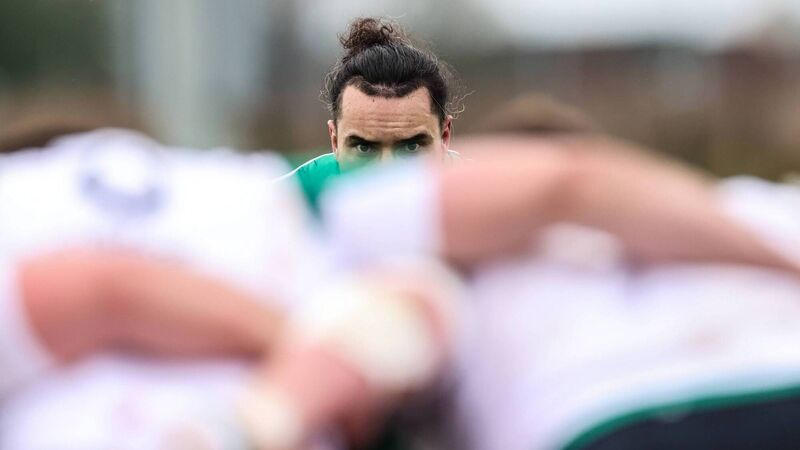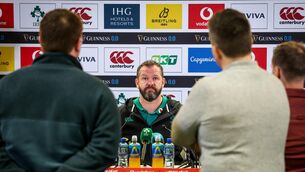Larry Ryan: Does it all turn into rugby in the end?

A fully-focused James Lowe during an Ireland training session yesterday.
It should be some consolation to the hurling man or woman suffering withdrawal symptoms — the arrival on centre stage of the nearest thing, the rugby.
In theory, it’s all there for them this weekend, the rucking and mauling and offloading and attrition and collisions and lines of running and all that jazz.
After the action, they will even be soothed with familiar talk of process and learnings and work-ons. And if everything goes to plan they will be treated, somewhere along the line, to a lad cleaning out a dressing room with the aid of a camera phone. Sweeping the sheds, as we now know it.
All right, they might be missing the little bits of breathtaking skill they are used to on their own big sporting weekends, but you wouldn’t always get much of that this time of the year anyway, in the Only The League.
And yet, there’s a growing danger the hurling fraternity won’t be able to fully enjoy the Six Nations action this year, so consumed are they with worry that this is the way their own game is heading.
Last year, GAA writer Martin Breheny began to fret about the ‘rugbyisation’ of hurling. Christy O’Connor wrote in this paper lately that we were nearly there, that every big hurling match now “is heavily defined by rucks and turnovers, ferocious tackling, and systematically produced possession”.
GAA director of games Pat Daly followed that up with official concern.
“He (Christy) had an article about the rugbyisation of hurling. If people are happy enough for that to continue, that’s fair enough. I wouldn’t and as an administrator within the Association I would be very concerned with the shape of things.”
And then, as if the optics weren’t bad enough, you have Tipp calling up an actual rugby player, even if the label might be unfair on the hurling skills Alan Tynan showed as a minor.
So there is a real danger hurling people won’t be able to focus at all on the action over the next few weeks, and that all they will see is a dystopian, eggpocalyptic vision of hurling gone tragically wrong.
As a public service, therefore, to put their minds at some kind of ease, this column is about to deviate into uncharted water — AKA research — to provide succour. To show the hurling man he is, at least, not alone.
Armed with Google and the useful search terms ‘turning into rugby” and ‘becoming like rugby’, I think we will soon see that these worries are common to nearly all sports. Indeed, it might even be innate to the human condition, this great existential fear that everything turns into rugby in the end. At least if you eat enough whey.
Gaelic football — the code responsible for 99% of all sporting worry — is, naturally, at the vanguard of rugbyfixation.
A cursory glance at search results finds Martin McHugh once musing that the game is “becoming like rugby league” while Colm O’Rourke bemoans a “continuous rolling maul”. Frank Roche, writing in the Herald, suggested “Gaelic football is turning into rugby, and we don’t mean that in a positive way either. It’s all about ‘the system’ and not about the spontaneity.”
And of course it can never be forgotten that Aidan O’Shea led Ireland on a ‘captain’s run’ ahead of a 2017 International Rules test.
Down Under, the AFL crowd are frequently beside themselves at contamination from the other oval. Coaches are squeezing the skill from the game, lamented footy legend Malcolm Blight. “I just reckon we have got to be careful we don’t become rugby.”
Indeed, around a decade ago, the AFL set up a laws committee to rival the famed GAA vigilance committee — “to monitor the code amid fears it is evolving into a game resembling rugby union.”
Basketball, notionally non-contact, should be safe enough, you’d think. Not so. The leniency of officials is, I read here, turning the NBA “into rugby on hardwood”.
Elsewhere, college officials are praised for “trying to keep the sport from turning into rugby”. “They want less physicality and more finesse, which is the way basketball should be played.”
There is a, largely unsubstantiated, claim out there that cricket “is turning into rugby league”. And in passing, I noticed sceptics dismiss polo as a spectacle by calling it “worse than rugby”.
While self-esteem at the top of kabaddi can’t be great since it was described as “like rugby without the ball”.
Former referee Owen Doyle threw two more sports under the bus, describing the breakdown in rugby as “a strange, dangerous combination of sumo and judo”.
And while it cuts both ways, rugby league is riddled with mortification at the notion it might be morphing into union. “We’re turning into rugby union, a technical bore-fest, where only the man in the middle knows what the hell he’s blowing up for.”
While there is at least one online physician out there willing to suggest motherhood could be “worse than rugby” — “as the cause of musculoskeletal aches and pains”.
What about football? Does it have much to worry about, even with rugby’s moral leader, Nigel Owens, forever insistent that ‘this is not soccer’? Well, we recall how Arsene Wenger sounded at his lowest ebb, his most demoralised, after he had faced the trip to Stoke to play the “rugby team”.
The lengthy stoppages to ‘go upstairs’ have prompted many a publication to wonder if ‘VAR is turning football into rugby’.
There are troubling signs for football too in the steep rise of needless jargon for the most basic of activities — the counting of ‘recoveries in the final third’ and the lauding of players with a ‘high carry volume’.
And there’s another unsettling question to consider.
If you take into account the mysteries of handball; if you ponder offside and the random resetting of phases; if you consider double jeopardy and unintentional fouls and clear and obvious errors; nowadays when a football referee blows his whistle, might you have as much chance of knowing which way it’s going if you were looking blankly into the heaving recesses of a ruck?
The old Douglas Adams line increasingly comes to mind when we are talking about refereeing and VAR.









